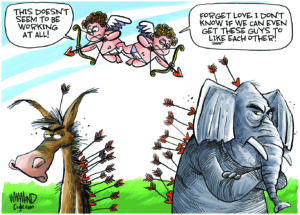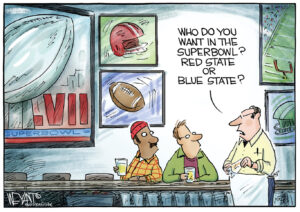The Silent Majority
Voters put Democrats in control of both houses of Congress last fall and, for this act of civic determination, they face an infuriating conundrum. Republicans are still running things.WASHINGTON — Voters put Democrats in control of both houses of Congress last fall and, for this act of civic determination, they face an infuriating conundrum. Republicans are still running things.
The same folks who brought you the Iraq war, the refusal to act on the health insurance crisis, the fiscal meltdown that leaves crucial government functions underfunded while managing to drive up the national debt are still bringing you: the Iraq war, the refusal to act on health insurance and a looming showdown over spending priorities that leaves the fiscal meltdown unaddressed.
After the “thumpin’ ” President Bush says his party suffered in the midterm elections, a few things were supposed to happen. The White House was supposed to adapt to the new political terrain, negotiating with the opposition on most matters — especially rudimentary legislation such as annual spending bills — and only draw strategic lines-in-the-sand with selective vetoes that involve a president’s core principles. This is what most contemporary presidents who confront a Congress dominated by the opposition party have done. Bush hasn’t.
Republicans in Congress — especially in the House — were supposed to learn from their mistakes and stop backing themselves into ideological corners that are way outside of mainstream thinking. They didn’t.
Instead, Bush and a solid core of Republican lawmakers (albeit a shrinking one) are managing to get their way on serious issues of the day, whether it be the conduct of the Iraq war or health insurance for low-income kids who currently do without it. The veto fight over the terms for renewing the State Children’s Health Insurance Program — a wildly popular program that has had bipartisan support since its inception a decade ago — is to be played out this week. Democrats in the House lack the votes to override Bush’s expected veto, though the Senate passed the measure with plenty of votes to spare.
None of this can be understood unless you look in the right place for the answers. That’s not in a civics book. It’s in the all-too-familiar television graphic we see during election coverage, the one that colors Democratic regions blue and Republican strongholds red.
The Democratic gains in the 2006 congressional elections means there are fewer Republican moderates — they were thrown out of office, particularly in the Northeast and Midwest, making those regions bluer. This makes it nearly impossible to cobble together a bloc of swing Republican moderates needed, say, to override a presidential veto of an enormously popular bill to provide health care to kids.
Looked at another way, about half of the 159 votes in the House against the popular children’s health measure came from lawmakers in the South — the reddest of red states. They’re with the president when he says this program — run by the states, with care administered through private managed-care insurance companies and delivered by private doctors and nurses — is really socialized medicine. The few Republicans who joined Democrats in passing the House legislation are in the dwindling handful of districts that could swing either way. Case in point: Vern Buchanan, the Florida Republican who won Katherine Harris’ seat by 369 votes — and with a contested result because of machine malfunctions that appear to have lost about 18,000 votes — cast his vote with the Democrats. So did Virginia lawmakers Tom Davis and Frank Wolf, who broke with most of their delegation because they represent districts in suburban Washington that are growing ethnically diverse, and voting more Democratic. Davis, meanwhile, intends to run for Senate next year — and Virginia in statewide elections has lately been a killing ground for Republican candidates.
So even as the Democratic Congressional Campaign Committee hammers at the kids insurance issue with radio advertisements and robo calls, there’s not much chance of turning around enough Republican votes to override Bush’s health-insurance veto. There are only about two dozen Republicans on the group’s target list, and they are in regions such as the Southwest and Midwest, where the Democrats are tilling ground for the 2008 elections. “We’d prefer to get these kids the health care they need,” says Jennifer Crider, a DCCC spokeswoman.
With that more noble goal out of reach, the only other option is what voters find distasteful — turning a common-sense issue, such as getting health insurance to poor kids, into a political cudgel.
Marie Cocco’s e-mail address is mariecocco(at)washpost.com.
© 2007, Washington Post Writers Group
Your support matters…Independent journalism is under threat and overshadowed by heavily funded mainstream media.
You can help level the playing field. Become a member.
Your tax-deductible contribution keeps us digging beneath the headlines to give you thought-provoking, investigative reporting and analysis that unearths what's really happening- without compromise.
Give today to support our courageous, independent journalists.






You need to be a supporter to comment.
There are currently no responses to this article.
Be the first to respond.